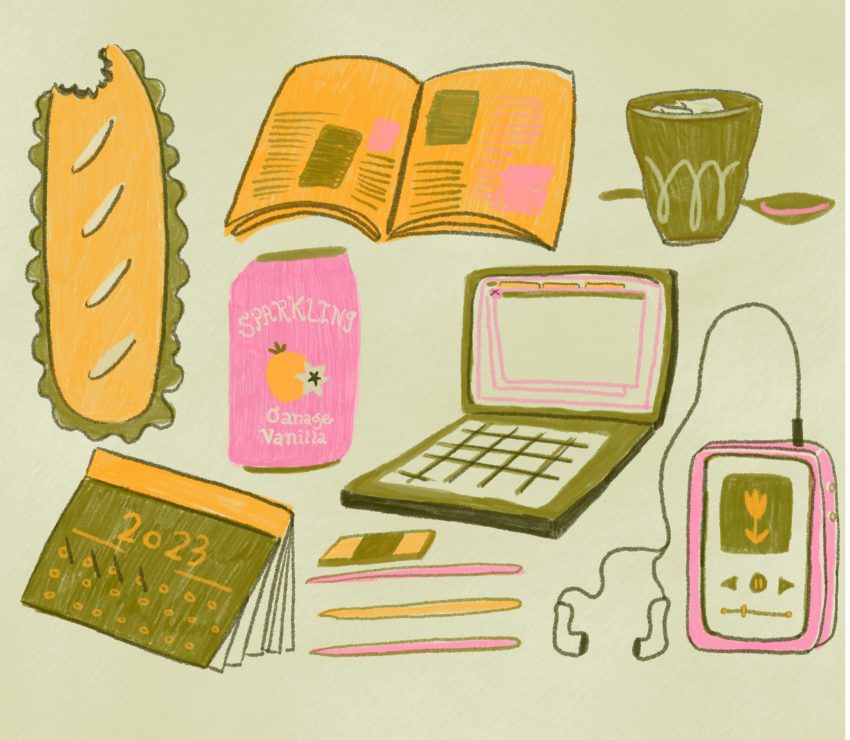Incorporate intuitive learning and community-ties to subdue the stress of school-life

Illustration by Chloe Latour.
When thinking of the term grindset culture, you may think of a person who consistently engages in multi-level marketing schemes or picks up yet another side hustle outside of their day job, constantly touting the importance of hard work and determination. However within the realm of post-secondary, many students erect a similar but distinct depiction of a person engaging in the grind.
Engaging in student grindset culture is to subtly brag about your triple-espresso and cigarette breakfast while frantically shuffling books into a bag on the way to an 8:30 class, gray circles drooping under your eyes from yet another all-nighter. It is to withdraw from socialization and hobbies with the excuse that there is no time for life outside of your studies. Above all, to participate in grindset culture is to feel pride in dedicating so much time to your education while relinquishing all things self-care, social, and sustainable.
Though it seems that many students have come to understand that the grindset is an insidious infiltration of capitalist work ethic that equates personal worth with productivity, it still sees some popular acceptance. While not ideal, it is often understood that some degree of grindset is necessary to succeed in post-secondary education. I am here to tell you that there’s another way, my friend.
This self-destructive approach is not the only route to success. I would like to propose an alternative: communal and mindful learning, a mindset which prioritizes building community ties and refining alignment to the body.
A key tenant of communal and mindful learning is fostering a sense of accountability and community with fellow students. While grindset culture upholds isolation-stemming from the idea that student success is a singular pursuit, communal and mindful learning encourages community outreach to deepen knowledge and community ties.
This could take various forms such as introducing yourself to dormmates by bringing baked goods to the common room or creating care plans with other students as an agreement to help one another with groceries, errands, or morale on difficult days. Also consider becoming involved in clubs on and off campus, as you may discover community in common interests such as birdwatching, podcasts, or intermural sports. Don’t see a club you’re interested in? Start your own! Whatever way feels best for you to engage with your community and create a sense of care amongst one another, practice it early and often.
Another pillar of communal and mindful learning is practicing active listening to your body. By paying attention to your own physical cues for breaks, rest, food, and socialization you can intuitively be kind to yourself. Hear your stomach grumble? Stop what you’re doing and eat. Find yourself rereading the same section of text over and over again with little to no retention? It may be time to step outside, get some exercise, take a nap, or practice breathing exercises. Feeling overwhelmed by the hectic university environment? Pack noise canceling headphones in your school bag and pencil time into your schedule for laying under one of the various oak trees on campus. In short, do whatever feels replenishing and sustainable for you.
Next, learn what supports are available to you at the beginning of the semester and embrace the help that they offer. Don’t wait until the ship has already sunk. This may look like finding out what healthcare is covered by your school insurance plan, getting familiar with the various support groups on campus, making an appointment with the school’s academic advising department, or registering for accommodations at the Centre for Accessible Learning.
Finally, it is pertinent to note that UVic operates within a capitalist society that can seem to require the acceptance of grindset culture. You will experience back-to-back exams, heavy course loads, rigid professors, and the like. In these times, grindset may feel like the only option, and sometimes it may be. However, I believe this makes it all the more necessary and radical to practice communal and mindful learning whenever possible. It is healthier in the long term, saves you stress and sleep and brings learning outwards rather than inwards.







